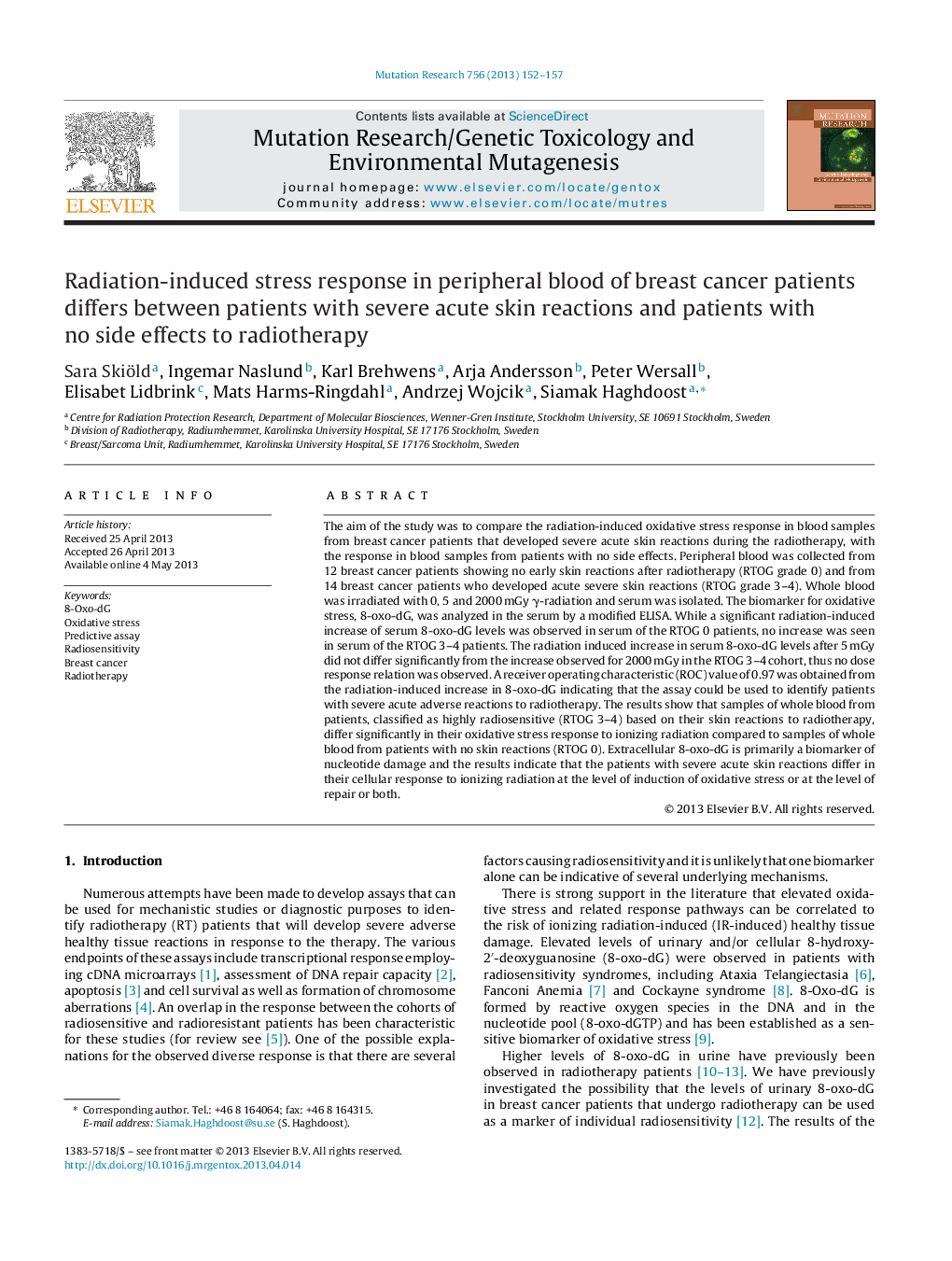| کد مقاله | کد نشریه | سال انتشار | مقاله انگلیسی | نسخه تمام متن |
|---|---|---|---|---|
| 8456514 | 1548603 | 2013 | 6 صفحه PDF | دانلود رایگان |
عنوان انگلیسی مقاله ISI
Radiation-induced stress response in peripheral blood of breast cancer patients differs between patients with severe acute skin reactions and patients with no side effects to radiotherapy
ترجمه فارسی عنوان
پاسخ استرس ناشی از اشعه در خون محیطی بیماران مبتلا به سرطان در بین بیماران مبتلا به واکنش های شدید حاد پوست و بیماران بدون عوارض جانبی به پرتودرمانی متفاوت است
دانلود مقاله + سفارش ترجمه
دانلود مقاله ISI انگلیسی
رایگان برای ایرانیان
کلمات کلیدی
موضوعات مرتبط
علوم زیستی و بیوفناوری
بیوشیمی، ژنتیک و زیست شناسی مولکولی
تحقیقات سرطان
چکیده انگلیسی
The aim of the study was to compare the radiation-induced oxidative stress response in blood samples from breast cancer patients that developed severe acute skin reactions during the radiotherapy, with the response in blood samples from patients with no side effects. Peripheral blood was collected from 12 breast cancer patients showing no early skin reactions after radiotherapy (RTOG grade 0) and from 14 breast cancer patients who developed acute severe skin reactions (RTOG grade 3-4). Whole blood was irradiated with 0, 5 and 2000 mGy γ-radiation and serum was isolated. The biomarker for oxidative stress, 8-oxo-dG, was analyzed in the serum by a modified ELISA. While a significant radiation-induced increase of serum 8-oxo-dG levels was observed in serum of the RTOG 0 patients, no increase was seen in serum of the RTOG 3-4 patients. The radiation induced increase in serum 8-oxo-dG levels after 5 mGy did not differ significantly from the increase observed for 2000 mGy in the RTOG 3-4 cohort, thus no dose response relation was observed. A receiver operating characteristic (ROC) value of 0.97 was obtained from the radiation-induced increase in 8-oxo-dG indicating that the assay could be used to identify patients with severe acute adverse reactions to radiotherapy. The results show that samples of whole blood from patients, classified as highly radiosensitive (RTOG 3-4) based on their skin reactions to radiotherapy, differ significantly in their oxidative stress response to ionizing radiation compared to samples of whole blood from patients with no skin reactions (RTOG 0). Extracellular 8-oxo-dG is primarily a biomarker of nucleotide damage and the results indicate that the patients with severe acute skin reactions differ in their cellular response to ionizing radiation at the level of induction of oxidative stress or at the level of repair or both.
ناشر
Database: Elsevier - ScienceDirect (ساینس دایرکت)
Journal: Mutation Research/Genetic Toxicology and Environmental Mutagenesis - Volume 756, Issues 1â2, 30 August 2013, Pages 152-157
Journal: Mutation Research/Genetic Toxicology and Environmental Mutagenesis - Volume 756, Issues 1â2, 30 August 2013, Pages 152-157
نویسندگان
Sara Skiöld, Ingemar Naslund, Karl Brehwens, Arja Andersson, Peter Wersall, Elisabet Lidbrink, Mats Harms-Ringdahl, Andrzej Wojcik, Siamak Haghdoost,
